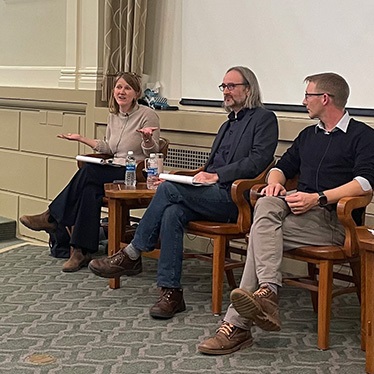Workshop Outlines Handling Crises with Skills and Grace
May 31, 2022

To Marius Gnalis-Rafai, each session of a spring workshop on crisis management offered a piece of a broader leadership puzzle. “Some sessions were more academic to provide the framework,” he said. “Other sessions were more practical, while others shared concrete experiences of crisis situations.”
Perhaps the most relevant presentation, though, was the session on crisis communications, said Gnalis-Rafai, a financial consultant from the Central African Republic spending his Humphrey Fellowship at Boston University. “This presentation gave very practical tools to prepare and deliver a suitable message,” he said.
He was among 44 Humphrey fellows representing 41 countries and 13 host campuses who participated in Leadership and Governance During Times of Crisis, sponsored by Syracuse University’s Maxwell School and administered by Executive Education.
“This workshop adds another dimension to the Humphrey fellows’ leadership experience,” said Keli Perrin, faculty lead and managing director of the Institute for Security Policy and Law at the Syracuse University College of Law. “Whether the crisis is global, local, or somewhere in between, the frameworks and expertise shared by faculty and practitioners enable fellows to better respond as leaders using these newly honed skills and perspectives.”
This year, two sessions of the workshop were offered to provide participants with the option of either a virtual or on-campus experience. It was the 10th year Maxwell offered the workshop, reflecting the perennial interest of the leadership skills necessary during crises. Fellows reflect a wide range of academic interests, including education, media, health care, economics, politics, and public policy. They are among the year’s 160 scholars from 93 countries.
Participants in the virtual session were welcomed by Kelsi Ward, Branch Chief, Humphrey Fellowship and Institutional Linkages, Bureau of Educational and Cultural Affairs at the U.S. Department of State.
The workshop included case studies that demonstrate real-world crisis management strategies. Strategies included preparation, media relations on sensitive issues, tracking issues that may evolve into crises, and the importance of reputations and trust.
“Although all crises are different, they unfold in similar ways,” Perrin said.
The workshop featured Maxwell faculty and Syracuse faculty with relevant expertise, including sessions on cultural sensitivity, crisis communications, national security and public health. University Professor Sean O’Keefe shared insights from his experience as NASA administrator, and Vice Chancellor J. Michael Haynie, who led Syracuse University’s response to Covid-19, reflected on leadership during a public health crisis. Other speakers included Arjen Boin, professor of public institutions and governance at Leiden University in the Netherlands and author of “The Politics of Crisis Management,” the textbook Perrin used to frame the workshop and Stephen Hagerty, former mayor of Evanston, Illinois, and founder and CEO of Hagerty Consulting and a member of Maxwell’s advisory board.
“Although I come from a country that has endured many crises, I have not been in leadership positions and I tend to be very critical of decisions made by officials when the rationale is not communicated,” Gnalis-Rafai said. One puzzle piece he’ll carry with him came from Haynie, who led Syracuse University’s response to the COVID-19 pandemic: “Be willing to take the arrows on behalf of others, and as much as possible with grace.”
Related News
School News

Apr 2, 2025
School News

Mar 26, 2025
School News

Mar 24, 2025
School News

Mar 18, 2025